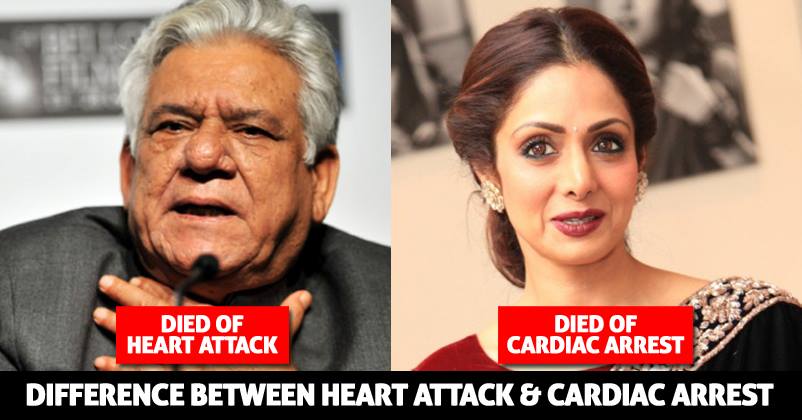People Think That Cardiac Arrest And Heart Attack Are Same, But They Are Not!

On Saturday, legendary actress Sridevi passed away in Dubai due to cardiac arrest. The news of her death has sent entire nation in the state of shock. Entire film industry along with millions of fans is mourning the death of the actress.

Entire media is reporting about her death. However, we have seen that some of the media house is reporting that Sridevi died due to “heart attack” in place of “cardiac arrest”, which is the real reason for her death. However, heart attack and cardiac arrest are two different medical conditions, Scroll down to know the difference between cardiac arrest and heart attack.
Heart Attack:
The heart attack happens when the heart stops getting oxygen-rich blood due to a blocked artery. The section of heart which doesn’t get the blood starts dying. If the blocked artery doesn’t open soon, the damage will keep increasing.

The symptoms of heart attack can be seen hours, days or even weeks before it actually happens. However, the symptoms are different for men and women. During a heart attack, a section of the heart dies but it doesn’t stop beating. It keeps sending blood to different organs of the body.
Cardiac Arrest:
Cardiac arrest is sudden and it happens without any warning. The main reason behind this is the electrical malfunction in the heart that results in arrhythmia, which is a term used for an irregular heartbeat. In cardiac arrest, the pumping gets interrupted resulting in blood supply to the other organs like brain and lungs getting stopped. Within seconds, the person loses consciousness. If treatment is not provided, the person can die.

As mentioned above, both the cardiac arrest and heart attack are different, people often link them together. The chances of cardiac arrest increase if the person has already suffered a heart attack. Cardiac arrest can happen during the recovery after the heart attack. It is not necessary that the heart attack will result in cardiac arrest; however, it is a common cause of cardiac arrest.
Some other conditions that lead to a cardiac arrest are heart failure, thickened heart muscle, arrhythmias and long Q-T syndrome.



